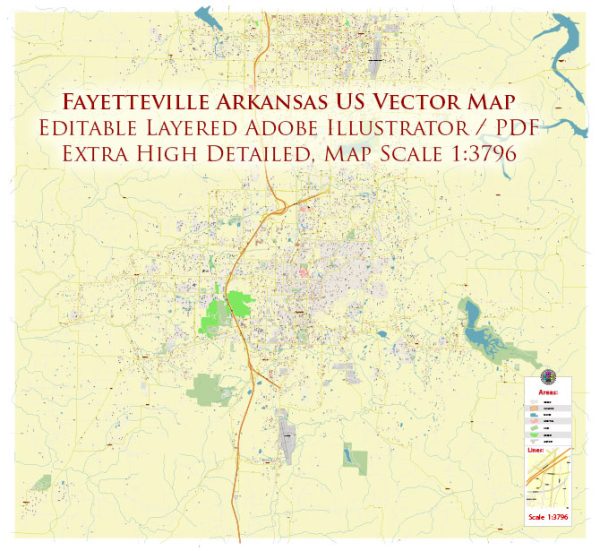Fayetteville, Arkansas, has a rich history that reflects the broader story of the United States. Here is a brief overview of its historical development:
- Native American Presence: Before European settlement, the area that is now Fayetteville was inhabited by indigenous peoples, including the Osage and Caddo tribes. These native populations had a well-established presence in the region for centuries.
- European Settlement: European settlers began to arrive in the late 1820s. Thomas L. McKissick, who arrived in 1828, is often credited with founding the town. The community was initially known as Washington, but it was later renamed Fayetteville in 1829, likely in honor of Lafayette, the French general who played a prominent role in the American Revolution.
- Civil War: During the American Civil War, Fayetteville, like much of Arkansas, was deeply affected by the conflict. The town was occupied by both Confederate and Union forces at various points in the war. Notable battles occurred in the region, and the presence of military operations had a lasting impact on the town.
- Reconstruction Era: Following the Civil War, Fayetteville, like many Southern communities, faced the challenges of Reconstruction. It saw significant social and political changes, and the University of Arkansas was founded in Fayetteville in 1871, becoming an important institution in the town’s history.
- Economic Development: Fayetteville’s economy began to diversify in the late 19th and early 20th centuries. Agriculture, especially apple and poultry farming, played a crucial role in the region’s economy. In the 20th century, the University of Arkansas grew in importance, and the city started to develop a more diverse economic base.
- Civil Rights Movement: Fayetteville, like many parts of the United States, saw its share of civil rights activism during the mid-20th century. Protests and demonstrations occurred in the city as part of the broader movement for civil rights and desegregation.
- Growth and Modernization: In recent decades, Fayetteville has experienced significant growth and modernization. The city has become a cultural and economic hub in Northwest Arkansas, attracting businesses, tourism, and a diverse population. It is also home to numerous cultural events, festivals, and outdoor activities, thanks to its scenic location in the Ozark Mountains.
- The University of Arkansas: The University of Arkansas, founded in Fayetteville, is a key element of the city’s history. It has become a major research institution, contributing to the educational, cultural, and economic development of the region.
Today, Fayetteville is known for its vibrant arts and cultural scene, a strong emphasis on education and research, and its thriving economy. The city’s history is interwoven with the broader historical narrative of the United States, reflecting its evolution from a small frontier settlement to a modern and dynamic community.


 Author: Kirill Shrayber, Ph.D. FRGS
Author: Kirill Shrayber, Ph.D. FRGS